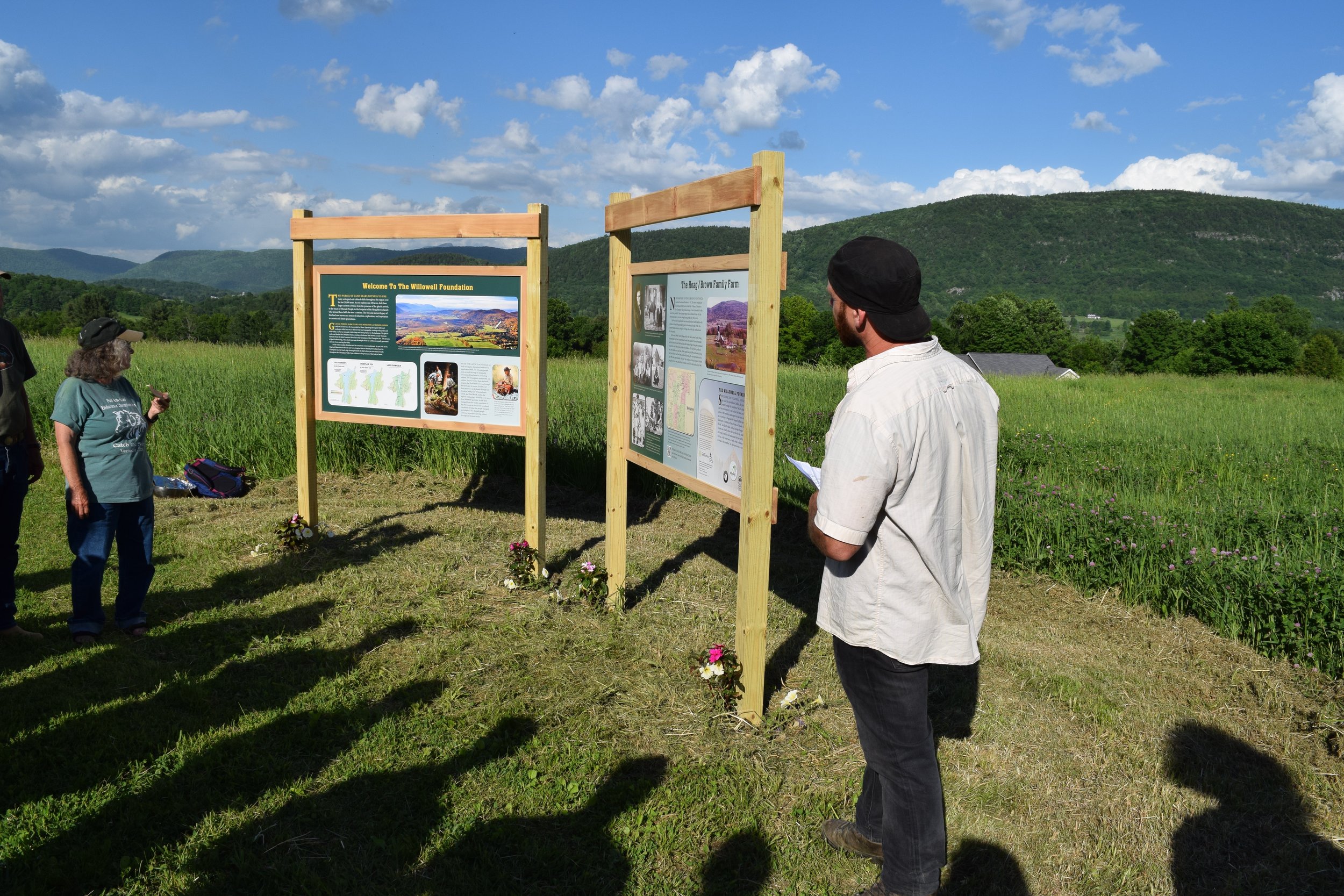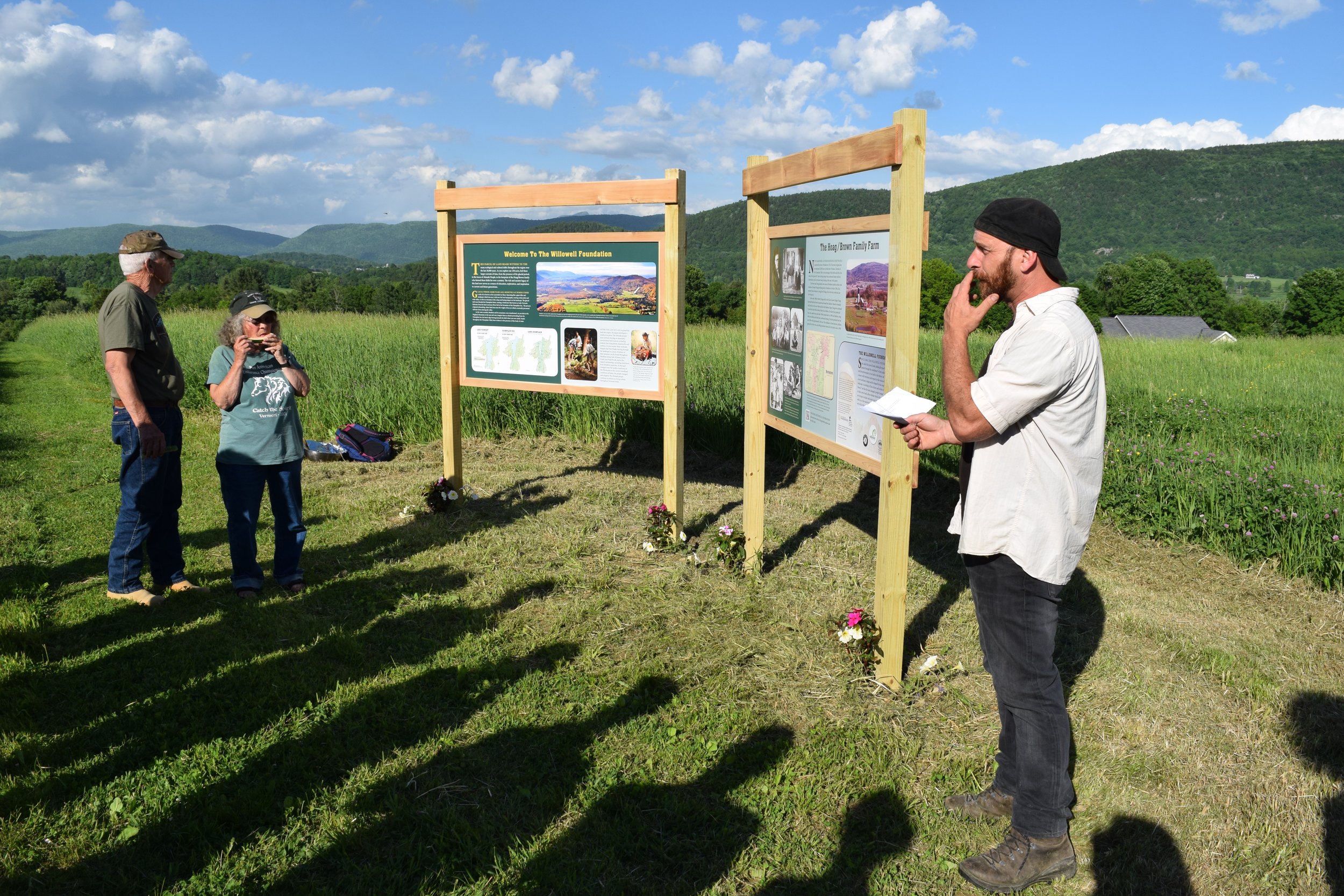
Our Impact with Youth Education
Every year, Willowell reaches almost 1,000 youth ages four to eighteen with its programming. Place-based programs like the Walden Project, Wren’s Nest Forest Preschool, the Pond Brook Project, and over a dozen summer camps teach our community’s youth critical life skills, engagement with community and environment, and self-discovery.
Most importantly, our programming encourages youth to explore their passions and develop their sense of self. Independent research on the values of place-based education substantiates the transformations Willowell has witnessed with its programming -- youth become better environmental stewards, are more active citizens in their community, and learn their pathway to long term happiness.
Additions to the Gordon Sculpture Park by Walden Project alumni Grace Corbett and Brian Raymond demonstrate the lifelong impact our programming has on Addison County youth. With Walden, Grace and Brian developed their interest and skill in art, and have since brought their education back to the community and environment that guided them with permanent fixtures on Willowell’s land.
Our Impact with Community Resources
From Willowell’s first initiative, the Walden Project, bloomed a host of new community building projects. Walden students worked alongside staff and AmeriCorps members to develop a community garden that produces thousands of pounds of vegetables each year that find their way into the bellies of local residents from the lunches cooked over the fire at Walden, to the food shelves in Addison County to the local school cafeterias. Every year Walden students and volunteers from a number of diverse groups from local community mental health organizations to Girl Scout troops to Middlebury College students take part in the planting and harvesting of crops while experientially learning about sustainability and the ecology of the region. Pizza from our famous clay pizza oven, topped with fresh veggies from the garden provides immediate feedback for our willing volunteers. The garden has been a source of both connecting and sustaining the community for fifteen years.
A few years ago, a small group of kind-hearted neighbors approached staff with an idea -- to expand Monkton’s wood bank into a project with greater capacity to serve locals in heating emergencies. Since then, Willowell’s land serves as home to the wood bank and coordinates communication among volunteers, H.O.P.E. and residents in need. Willowell AmeriCorps and Walden students also assist community members in processing, splitting, stacking, and delivering a few cords of wood annually to residents in Monkton, Bristol, Starksboro, Lincoln, New Haven, and sometimes beyond.
The Gordon Sculpture Park is the latest addition to the Willowell land and resource for the community. Willowell believes strongly in nature, the arts, and the intersection between the two as key ingredients for happy, healthy, and sustainable community. Now boasting multiple sculptures, created by Genese Grill, Behulum Mengistu, Ethan Mitchell, Meghan Rigali, Marela Zacarias, and Hongtao Zhou, and more, the park adds human expression to the consilience between the arts and the local ecology, providing visitors a chance to reflect on the intersection of people and the larger whole. The park and nature trails are open year round for visitors to explore.
Environmental Protection
Willowell has pledged to protect 109 acres of wetland and surrounding forest. These ecosystems provide important habitat and a travel corridor for the area’s wildlife and connect to a larger 400+acre preserve. Much of the protected area has undergone restoration efforts, such as tree planting, with the help of our partnerships and community volunteers including Keeping Tracks, The Lewis Creek Association and the Lake Champlain Basin Program.
Through school programs, the wetlands have served as an important educational tool in environmental studies for the area’s students. Walden students have also taken part in tree planting efforts elsewhere on the property with a focus on nut-producing trees to provide food for wildlife. The community garden is farmed using organic practices.
The Hoag Farm Interpretive Panel Series
The Hoag Farm Series pays homage to the history and culture of The Willowell Land. For thousands of years this area has witnessed great changes, movement, and shifts in human culture. From the glaciers that formed these mountains and valleys; to the time when The First People subsided off the land; to the turn of the century– this land has been home to many resilient and hard working people, plants, and animals.
The project was made possible in-part by grants from The Vermont Humanities Council and The Five Town Friends of the Arts. It consists of two interpretive panels on the Willowell land that tell the story of this particular parcel. This student and staff-led project focuses on the ecological shifts through time, the First People who inhabited the area, and the Hoag Family who owned and farmed the land before us. We gathered this information with the help of The Monkton Historical Society, The Vermont Folklife Center, and through research done by previous AmeriCorps members.
With the help from The Vermont Folklife Center, students and staff conducted ethnographic interviews with Abenaki Scholar, Melody Brook and members of The Hoag Family.
Many thanks to all who contributed: The Hoag Family, Melody Brook, The VT Folk Life Center, the Walden students who worked on the project, our dedicated AmeriCorps Service Members, David Schein, the Monkton Historical Society, and Emily Bissonnette. Thank you also to our funders The Vermont Humanities Council and the Five Town Friends of the Arts.


